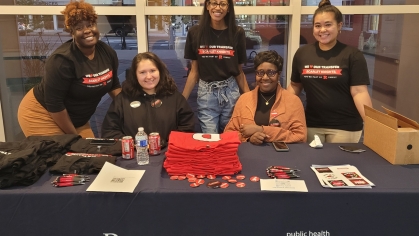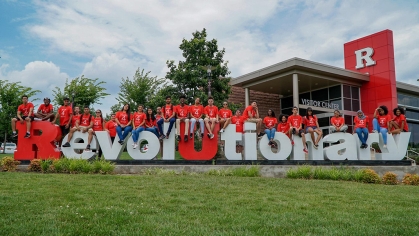More than a Meal: New Data on Dining Halls, Social Connectedness, and Retention

Campus dining halls help students build social connections that foster academic resilience, according to a new data analysis led by the Division of Student Affairs.
The findings—a small but statistically significant correlation between social connectedness in the dining halls and first-year retention—point to a key takeaway: Student meal plans, paired with high-quality on-campus dining options, are one of many interrelated factors that can help students stay on track to complete their degrees.
Studies have shown that, for university students, positive social connections contribute to academic success. Strong social interactions and relationships have been found to reduce the likelihood of depression, anxiety, and other mental health concerns; increase satisfaction with the student experience; and help students persist toward graduation.
“Rutgers–New Brunswick leverages every available resource to provide a welcoming, supportive environment for student success,” Senior Vice Chancellor for the Student Experience Salvador Mena said. “While we create new programs for wellness, advising, and experiential learning, this new data heralds Dining Services as a vital part of that ecosystem.”
For this new study, the Rutgers–New Brunswick Division of Student Affairs, its Dining Services Department, and the Rutgers University Office of Institutional Research and Decision Support (OIRDS) analyzed meal-swipe data from 5,500 first-year students who ate at the Busch and Neilson dining halls during Fall 2023.
The researchers’ measure of social connectedness began with the analysis that two students who swipe into the dining halls within one minute of each other are likely eating together—and students who do this more often are likely to be building stronger social connections with their peers. Two important findings emerged: Students’ social connectedness tended to improve week after week throughout their first semester. And their level of social connectedness became a meaningful predictor of student retention—a student’s likelihood to persist in their studies and return for the following semester.
One student’s experience illustrates these findings clearly. Josangely Villar, a Nutritional Science major beginning her junior year, said she and her peers find the dining halls to be a natural spot for socializing, studying, and brainstorming solutions to the challenges of university life.
“Last year, when a good friend and I were both going through some difficult times, we would meet in the dining halls to talk about what we were going through and share ideas,” Villar said. “While eating together, we didn’t just reassure each other; we each talked about campus resources that the other person didn’t know about. Connecting over a meal may seem like a simple thing, but the routine we built discussing and supporting each other really gave us something to look forward to each day.”
Rutgers–New Brunswick’s retention and graduation rates exceed national averages. A 2023 survey found that 93% of Rutgers–New Brunswick’s first-year students returned for their second year, compared with 71% among universities nationwide. This is due to many factors that have made Rutgers–New Brunswick the nation’s #15 top public university—including dining and other resources that help students socialize in positive ways across all areas of campus life.
“For first-year students especially, we strive to make them feel as comfortable as they would at home, so they’ll keep coming back and making social connections,” Nick Emanuel, executive director of Rutgers Dining Services, said. “That starts with high-quality food from national award-winning chefs. It includes a clean, bright, and welcoming environment. And it features culturally inspired menus and special meal events that bring students together, from Friendsgiving and Midnight Breakfast to our holiday and summer-themed celebrations.”
Dining Services offers a variety of meal plans to fit all students’ needs, including the new Scarlet Meal Plan which provides unlimited access to the four large dining facilities. Additionally, students experiencing financial need can apply for the No More Hungry Knights meal plan scholarship and find related resources at the Student Basic Needs Center.
The new Rutgers–New Brunswick study mirrored the findings of studies at other universities that found correlations between dining hall socialization and rates of retention and graduation.
Mena noted that the Division of Student Affairs plans to expand upon this research in support of the Rutgers–New Brunswick Academic Master Plan and its Student Success pillar. Future studies will seek to learn how data on students’ use of campus recreation centers and fitness spaces, and attendance at events and programs, might drive new insights on—and interventions for—student success.
It has long been known that students with strong social connections are more likely to navigate the challenges of their academic journey. Research shows that strong friendships help students maintain a positive mindset, take advantage of advising and wellness resources, and stay focused on their goals.
This new study provides statistical data to back up what the Division of Student Affairs has known anecdotally: Meal plans play an important role in helping students forge those social bonds and persist toward successful graduation.



